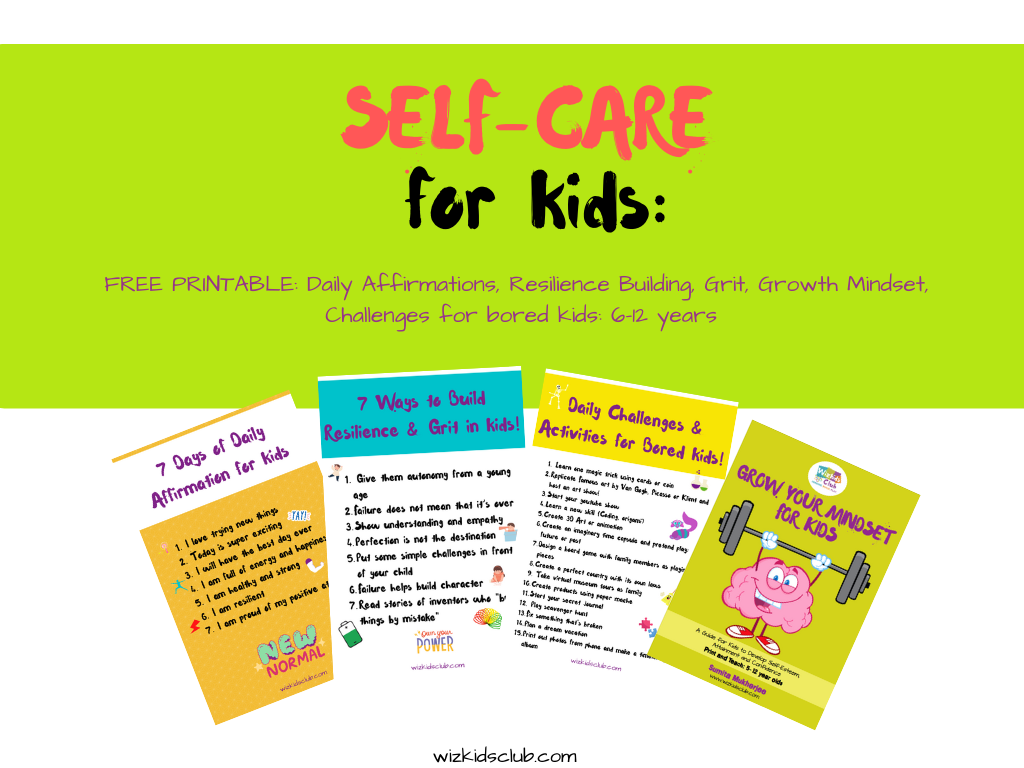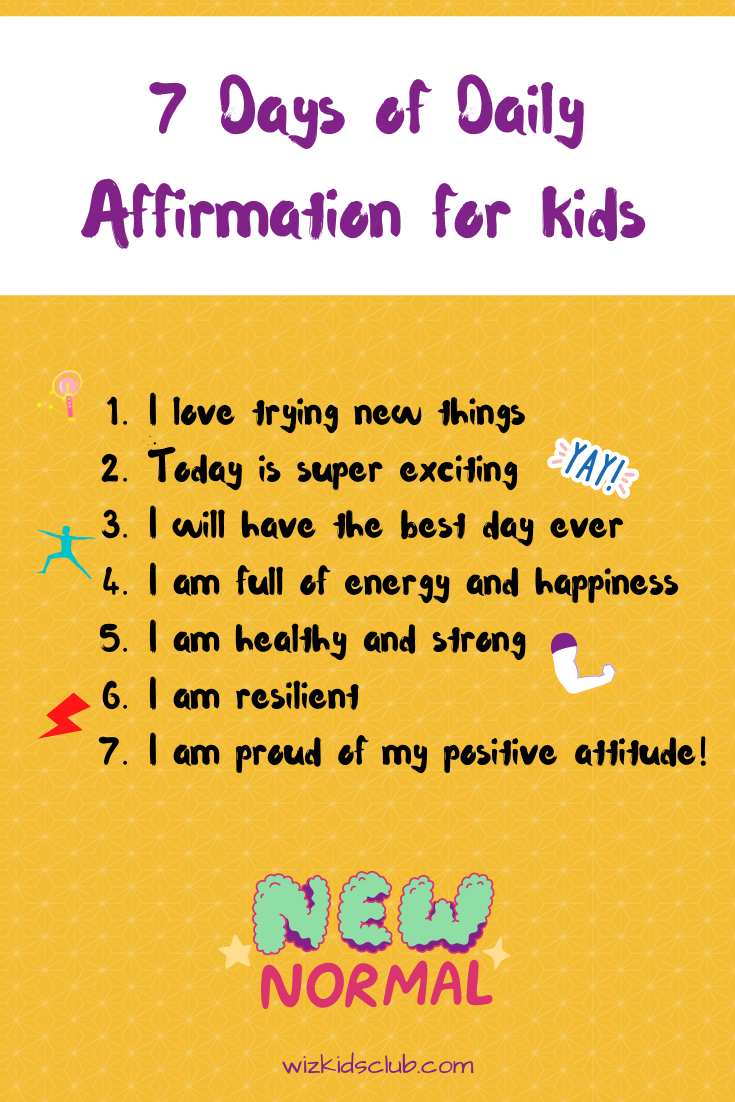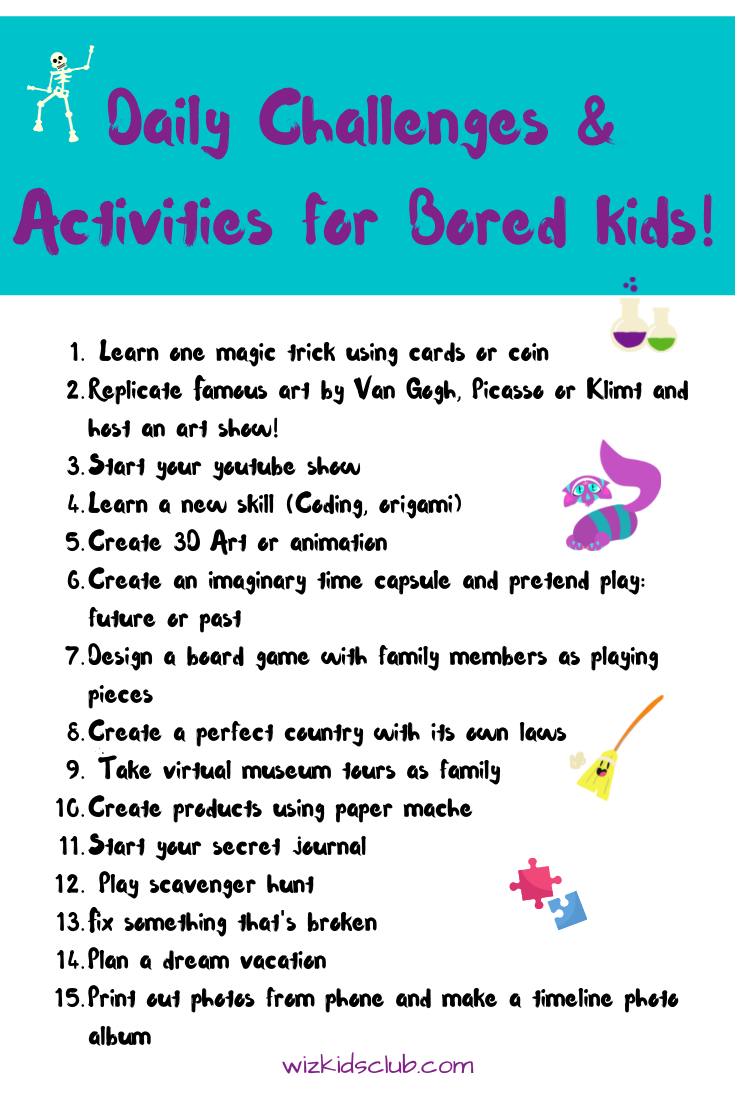The pandemic, social distancing and lockdown can impact kids negatively in the long run. Not being able to play with friends, remain isolated for weeks, can make them feel restless and uneasy. It is time to swoop in as parents, family or care givers, and give them some extra boost and guidance. So, how do we keep kids active, mindful, and emotionally strong during these unsettling times?
Daily habits and routines can address these emotions and assist repressed feelings to come out. Regular cleanse and daily mindfulness, is the way to go to achieve a well-balanced life.
Here are few self-care practices for kids to keep them in charge of their emotions and well-being.
-
AFFIRMATION:
The power of positivity is undeniable. However, sometimes we don’t feel it and need an extra boost to jump start our day. Daily affirmations help kids grow from strength to strength.
Here are 7 Daily affirmations for 7 days of the week to make it the very best. The magic mantra can really go a long way…
Download the FREE printable and use it! One daily affirmation for each day of the week.
In the “7 Daily Affirmations for Kids” printable, they will realise,
-
-
- how to believe in themselves
- how to bring out their inner strength
- to remain positive during unsettling times
- they can achieve anything when they’re persistent
-
Children develop strong Social-Emotional Learning (SEL) and growth mindset skills through inspiring pages, colorful illustrations, and engaging guided activities.
2. DAILY CHALLENGES AND ACTIVITIES FOR BORED KIDS:
Most of the recommended ideas have tutorial. Feel free to check them out here:
3. GRIT AND RESILIENCE BUILDING:
Do you want to build grit in your child? As a parent, we always want our children to succeed in anything that they do.
We want to prepare them for the ‘big, real’ world and want to give them the best opportunities available. We want our children to excel at school and be the best that they can be. How do we do this you ask?
Grit seems to be magic word! Psychologist Angela Lee Duckworth had a very interesting TED Talk where she mentioned that the students who were the crème of the crop at school were the ones who were willing to endure and stick to it throughout the school year. More so, the students who ended up graduating were likely made up of really diligent, assiduous students.
Thus proving that it’s not really about IQ or supposed talent level, but that anyone who is willing to work hard by getting gritty could succeed!
Children or students with grit know how to:
- cope in spite of setbacks,
- welcome mistakes as opportunities to grow,
- overcome obstacles.
Having grit appeared as a noteworthy forecaster of success. So what does this mean for you and your precious ones…time to get gritty folks! So how do we build GRIT in your child?
So let’s look at 7 great ways to build GRIT in your child:
- Failure does not mean that it’s over: I think this is one of the most important gifts that you can impart to your children. Failure does not mean it’s the end of the road. Failure does not mean that everything is lost. In fact, children should be encouraged to evaluate what happened and what they learned from their failure. There is always a gift wrapped up in a failed attempt. A little lesson showing you what worked and what didn’t work. Encourage your child to look for these clues and to see how they can use what they learned in their next attempt. Take this quiz and check their learning styles. Don’t scold them and make them feel bad, otherwise, this will reduce their hunger to try out new things. Pull up a list of successful historians, inventors and business people who have failed insanely but because they didn’t give up it paid off!
- Give them autonomy from a young age: I am not saying leave them in the house alone for hours on end! That will scare any child! What I am saying is that easy with the anxiety. Keep your hands to yourself and put a pin in your mouth and support from the sidelines. Only step in if they really need you or need encouragement. Let them attempt in figuring out whatever task it is on their own.
- Show understanding and empathy: When you see that you child is frustrated and disappointed in themselves, don’t go straight to ‘fix it mode’ to make it better or to save them from the pain. Validate their feelings, “I know this is harder than expected”, “I am so sorry it’s not going well”. Ease them through the grieving process, allow them to feel and show them that you understand and that you are on their side. By showing your child that you believe in them, you are helping in building their resiliency.
- Perfection is not the destination: Careful not to be the ‘perfection police’. Monitoring everything your child does, reminding them that they could do a better job consistently, will surely knock their confidence level. They will fear trying anything out of fear that it might not be right or perfect for your standards. Unless it’s absolutely detrimental that they get it right, let them learn for themselves. This helps build their own confidence and ability in themselves as well as experiencing the pleasure of achieving something.
- Put some challenges in front of your child: That’s right! Get your child involved in some DIY activities, STEAM activities, board games or whatever, it doesn’t really matter what it is. Put them in a situation where they need to figure it out and triumph something that is seen as difficult. Don’t set them up to fail of course, give them all the necessary information and guidelines to set them off and allow them to figure out the rest. Again this gives your child the confidence to confront challenges and to take risks.
- Failure helps build character: It can make kids become honest with themselves. It can also help them trust themselves more when making future decisions and future attempts. It also helps them discover their weakness and strength.
- Read stories of inventors who “build things by mistake”: It turns out many of society’s most well-known inventions were simply mistake made by people in their quest for creating solutions to problems. How did someone think of the slinky, and silly putty, and potato chips? Read stories of famous inventors and how their “mistakes” lead to amazing inventions. Something they can try as well!
Take the time to build grit in your child!
Encourage your child to try out new experiences and challenges. Support him/her and be their biggest fan, however, be careful to not be overprotective because that defeats the purpose. You want to equip your child to be able to handle the world, and as you know as a parent, having a little bit of grit goes a very long way!
4. GROWTH MINDSET FOR KIDS:
Follow the 5 Day Practice Guide to grow your child’s mindset. Mindset is everything! This printable 5-day guide can help children develop a growth mindset and teach them how to become resilient.
The ebook includes goal setting worksheet, self-esteem developing activity, motivational doodle page, self a guide for parents and teachers to print and keep.
Download the free e-book and grow your child’s mindset today! Get it here:
A must have resource for parents, teachers and educators.
Conclusion:
By daily following these printable and activities, you will be enabling kids to grow from strength to strength. Keep me posted on how it goes. What works and what doesn’t! Don’t forget to comment below and share your thoughts on Facebook.






